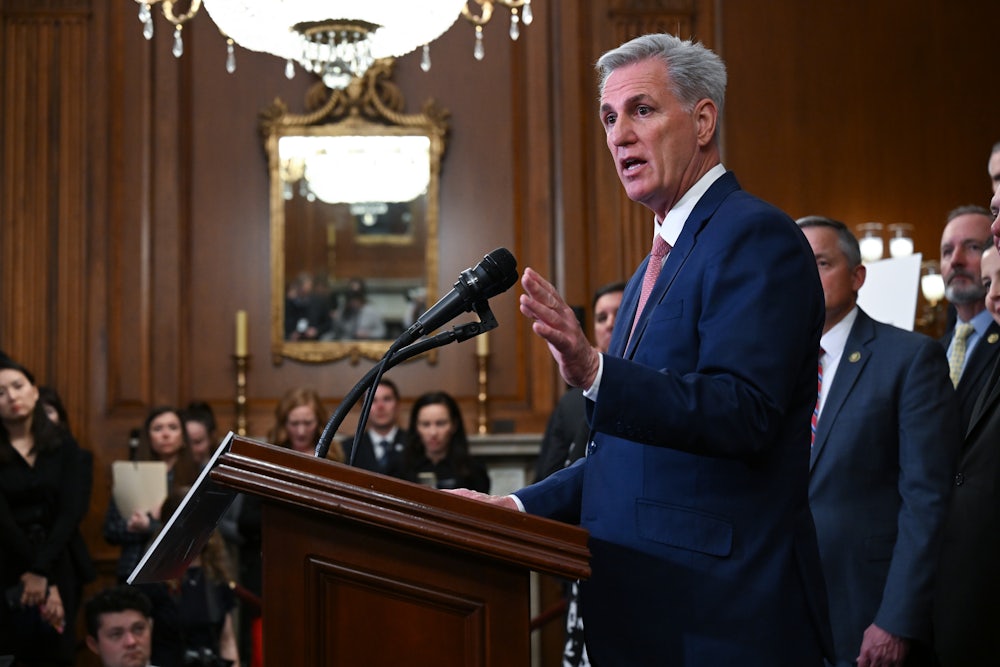On the hunt for the means to reduce the federal deficit without raising taxes or futzing with Social Security and Medicare, congressional Republicans have recently turned to a well-worn idea for cutting federal spending: strengthening work requirements for low-income Americans to qualify for key social programs. But adding new work requirements, or supplementing existing ones, is not the silver bullet for balancing the budget that Republicans are seeking—and even if it were, Democrats are not likely to accept dramatic changes to nutrition assistance and health care programs.
In a letter to President Joe Biden last week, House Speaker Kevin McCarthy floated potential areas for cutting federal spending as part of debt ceiling negotiations, including “strengthening work requirements for those without dependents who can work.” Biden and congressional Democrats insist that any discussion of balancing the budget should be separate from raising the nation’s borrowing cap, an impasse that has yet to be resolved even as the country creeps closer to defaulting on its debts.
Adding work requirements to the Supplemental Nutrition Assistance Program, or SNAP, and Medicaid would reduce the deficit but would not be nearly enough to balance the federal budget, said Marc Goldwein, the senior vice president and senior policy director for the Committee for a Responsible Federal Budget. “You could eliminate SNAP and Medicaid and you wouldn’t balance the budget, so you’re not going to balance the budget with work requirements,” Goldwein said.
But Republicans are already mulling expanded work requirements for SNAP and Medicaid. Earlier this month, Republican Representative Dusty Johnson introduced a bill that would raise the cutoff age for work requirements for able-bodied adults without dependents, and limit state waivers for work requirements. An analysis by the left-leaning Center for Budget and Policy Priorities found that 10 million people would be at risk of losing their SNAP benefits under Johnson’s proposal.
Able-bodied adults without dependents must find employment within three months or lose their SNAP benefits. Some states may request the federal government waive these requirements if they have a certain unemployment rate or insufficient job openings for able-bodied adults. Johnson argued to reporters last week that these waivers create “really egregious loopholes.” “Any of the changes to the ages in general I think are less important,” he said. Senator John Boozman, the ranking member of the Senate Agriculture Committee, agreed that “the waiver system is being abused.” The time limit for able-bodied adults was waived across the country by a law passed at the beginning of the coronavirus pandemic.
Johnson’s bill is more of a messaging document than a policy prescription. Democrats control the Senate and the White House, and will likely not be amenable to adding hurdles to accessing the social safety net. Senator Debbie Stabenow, the chair of the Senate Agriculture Committee, noted that the time limit requirement would soon come back into effect, due to the end of the Covid-19 public health emergency. She also called additional work requirements a “complete nonstarter.” Democrats as a whole appear to be in lockstep opposition to strengthening SNAP work requirements, even adopting a hashtag on Twitter to demonstrate their commitment to protecting the program.
The House and Senate Agriculture Committees are beginning to negotiate the farm bill, massive legislation that needs to pass every five years and includes funding for nutrition programs like SNAP. The last time Congress passed a farm bill in 2018, the Republican-led House narrowly passed a measure with significant cuts to SNAP, as well as beefed-up work requirements. However, that legislation was unable to make it through the Senate—which was then also under Republican control—and the final farm bill was a far more bipartisan measure, without any SNAP cuts.
Representative Glenn Thompson, the chair of the House Agriculture Committee, reiterated to reporters last week that SNAP was the jurisdiction of his committee, and not the purview of the House Appropriations Committee, which has yet to release its budget blueprint. While addressing “work opportunities” is one of Thompson’s priorities in SNAP, he noted that many such provisions are already in place. “Some folks don’t recognize that we actually have work requirements,” Thompson said. However, he didn’t rule out addressing work requirements in the upcoming farm bill, adding that “there’s probably some improvements” that could be implemented in the nutrition provisions.
While Republicans have insisted they will not cut Medicare or Social Security, they have seemed more open to Medicaid cuts. Axios reported last month that beefing up work requirements for Medicaid may be the only health care spending cut upon which all House Republicans could agree. As with the idea of cutting SNAP, the concept is useful as a political marker for Republicans in potential future negotiations, but there are limits to how far they’ll be able to proceed with a divided Congress. Moreover, Biden has pledged to fight Republicans who support “gutting” Medicaid, and Democrats have also indicated that they plan to hammer GOP lawmakers on the issue.
Work requirements generally have a mixed record in fulfilling their purpose. In Arkansas, a Medicaid work requirement for able-bodied recipients temporarily implemented initially resulted in thousands of Arkansans losing their benefits. A Harvard study found that the policy did not boost employment, and made it more difficult for those adults affected by the work requirements to pay their medical bills. (A federal judge blocked the Medicaid work requirement in 2019, and the Biden administration rolled back requirements in Arkansas and other states; current Arkansas Governor Sarah Huckabee Sanders is now seeking federal approval for a new work requirement for the state’s Medicaid expansion.)
A recent analysis by the Congressional Budget Office also found that adding work requirements to Medicaid would increase employment by a very small amount, but result in 2.2 million people losing their coverage. The same report found that expanding SNAP work requirements would modestly increase employment if it was paired with support and training services, but that average income would decline. Another 2021 study concluded that work requirements dramatically reduced SNAP participation from able-bodied adults without dependents, with limited effects on employment.
Democrats have maintained that work requirements should remain off the table in negotiations. When asked about Republicans seeking additional work requirements on social programs, Senator Sherrod Brown responded, “Of course they are.” “They just want the people who already have so much to have more, and the people that struggle to have less, and that’s just clearly their view of the world,” Brown told me last week.
Biden and McCarthy have met only once to discuss lifting the debt ceiling. So far, each side has stuck to its respective guns—McCarthy and Republicans unwilling to raise the borrowing cap without any strings, yet still not releasing their own budget, and Biden uninterested in negotiating on the budget in concert with the debt limit. Work requirements thus remain an important rhetorical tool for both parties: Republicans for, and Democrats against.
But Goldwein argued that any serious conversation on balancing the budget—when a serious conversation occurs—should be expansive. “We should be able to have a discussion over work requirements, over taxes, over everything,” he said. “It’s a big budget, and we’re going to have to put all of it on the table if we’re going to move seriously in the direction of improving our outlook.”










